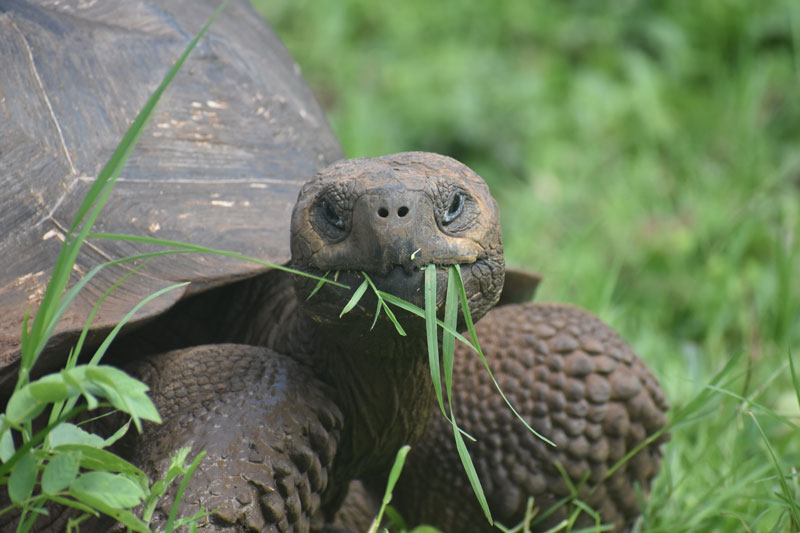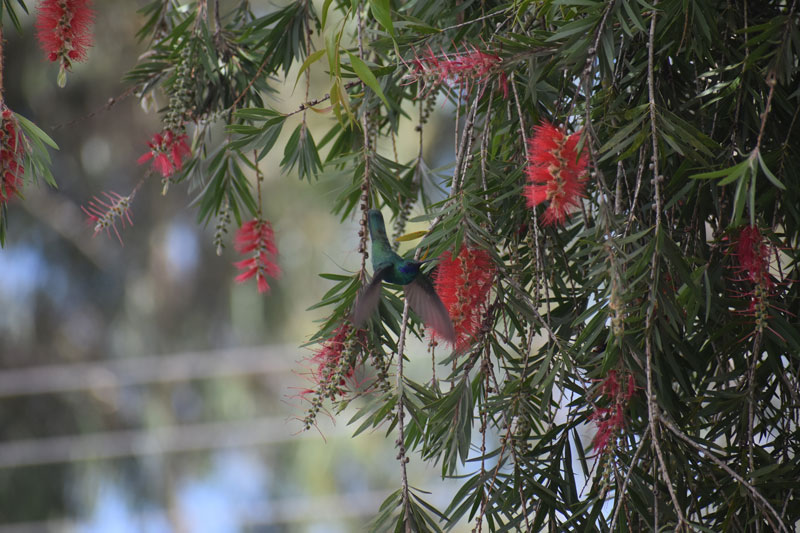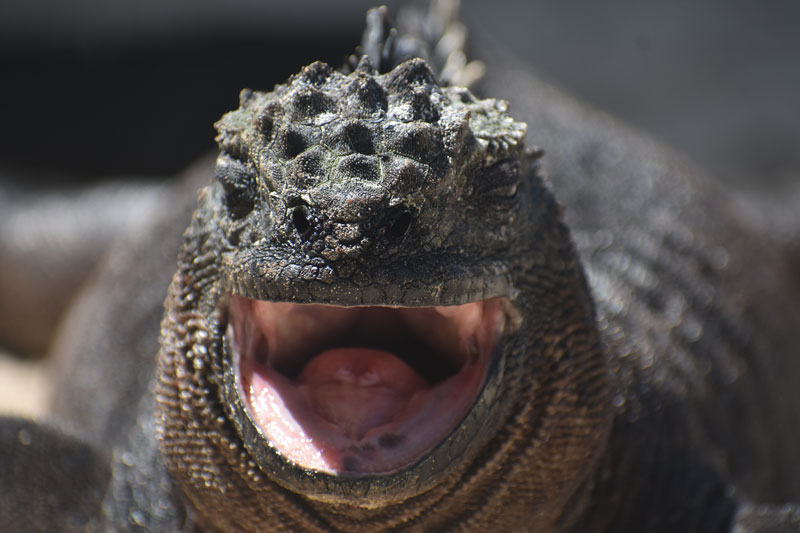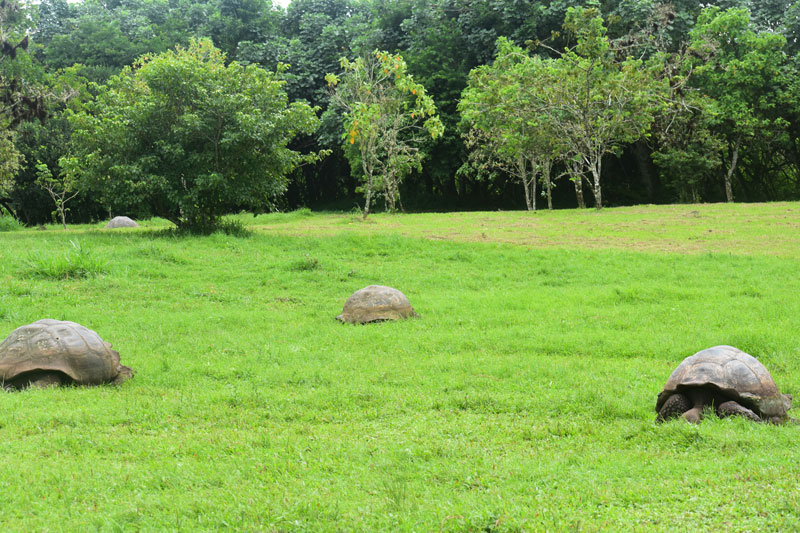Pilgrims of Science
Story by Chris Francis '13
Scott Collins ’02 and Kosha (Baxi) Carstens ’02 have dreamed of going to the Galápagos Islands since they were children growing up together in Ottawa, Illinois. This summer, they finally went with Scott's class of high school biology students.
Scott Collins ’02 and Kosha (Baxi) Carstens ’02 have known each other since they were two years old, and it’s thanks to Illinois Wesleyan that their friendship brought them both, along with Scott’s class of high school biology students, to what Kosha calls the holy ground of the Galápagos Islands in summer 2023.
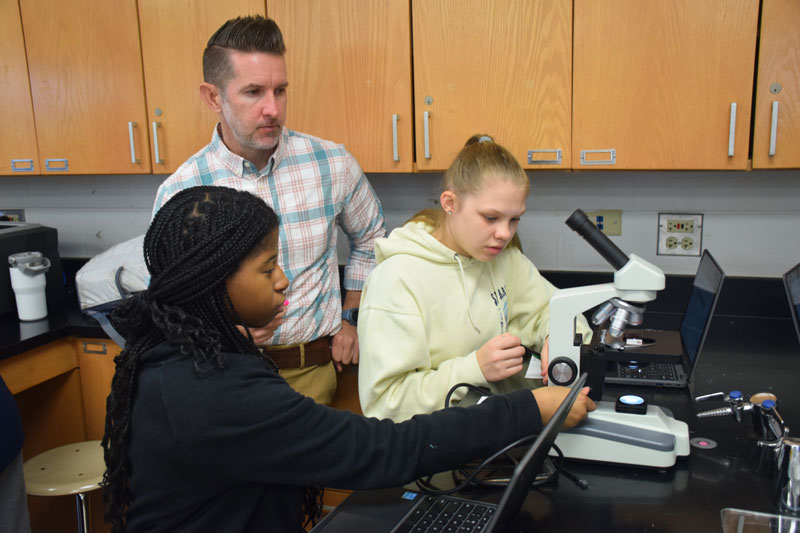
Scott and Kosha both arrived on campus in 1998 as biology majors, where Kosha jokes she was “not sure what I would have done or if I would have made it out without Scott next to me.” In Scott’s case, he initially planned to become a doctor, but he left IWU determined to become like the teachers who had inspired him.
“Dr. (Thomas) Griffiths was a professor of mine, and I loved the way he taught. He made me realize that I don’t have to be in an operating room to help people,” Scott said. It also helped that Scott’s mother, Louise (Stephens) Collins ’69, is a music education IWU alumna who still teaches today.
Scott became a biology teacher at Lemont (Ill.) High School, where he has stayed since graduating from IWU, and where he saw an opportunity to enhance what he had initially experienced as a high school student in Ottawa, Illinois.
“We had student trips to England and France. It was a formative experience to see other cultures and get out of the small-town bubble, which I think there’s also a bubble around the suburbs. But it was a sightseeing trip,” Scott says. “It wasn’t until 2017 that I had enough courage to start doing my own trips.”
· · ·
As a biology teacher trained in IWU’s own experiential learning in the tradition of John Wesley Powell, Scott was most interested in taking his students deep into nature. He wanted them to get their hands dirty experiencing a taste of the extended field work that they might perform as a biologist, and he wanted to make sure that they did something to help preserve the nature they were engaging with.
The first class trip he led as a biology teacher was to Yellowstone National Park, where Scott and four of his students “did a vegetation depletion survey, literally counting blades of grass in the middle of a vast valley with bison walking up to us,” Scott said. “We were informing their decision about how many bison to cull that year, (and) they culled a little bit fewer than planned because of the data we found.”
“You would never know that there are people who do that unless you see it for yourself. I had a student who was dead set on dental school, but then she switched to going to school in Montana to become a park ranger” on account of her experience at Yellowstone, he said.
Meanwhile, Kosha had earned her master's in zoology and evolutionary biology from Michigan State University. She pursued a career in the pharmaceutical industry and got her second master’s in bioethics and health policy from Loyola University, but she was jokingly jealous of Scott’s class trips.
“I have been begging him to let me come to every trip he’s gone on,” Kosha said. “Then he called me and said ‘wanna come to the Galápagos?’ I nearly fainted.”
“I invited her to come as our resident biologist,” Scott said before the trip. “She did a lot of evolutionary research on bats,” inspired by Griffiths, who specialized in the field, “so she will be a great resource for the students.”
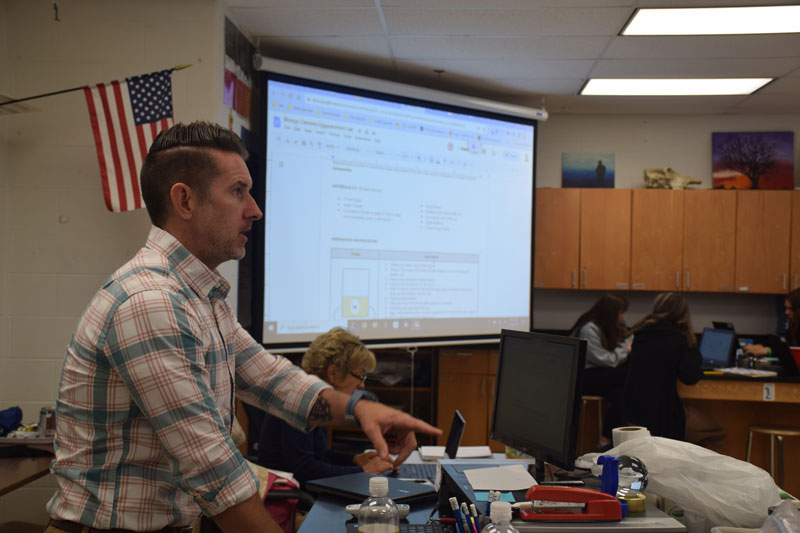
Since 2017, Scott had chosen destinations based on what his students were interested in and what was feasible for a week or so of travel. Trips included surveying invasive fish species and uncovering an ancient city in Maui, measuring glacial melt and exploring land exposed by melting ice for the first time in recorded history in Alaska, and planting coral and exploring shipwrecks off the coast of Honduras. But the Galápagos Islands — which famously inspired Charles Darwin's theory of evolution — were always a frustratingly difficult dream for Scott.
Getting to the remote Pacific islands is a two-day process in itself. The Galápagos Islands are closely protected by the government of Ecuador, for which they provide science tourism and a treasured wonder of the natural world as the location with the greatest biodiversity on land. By finding a company that could arrange the trip to fit their needs, Scott was finally able to bring his dream to life in July 2023.
“Both Scott and I are going to cry about a thousand times, I bet. It’s hallowed land for scientists like us,” Kosha said in the weeks before they set out.
· · ·
Scott and 15 of his students, along with adult chaperones including Kosha and some of Scott’s former students, landed in Quito, Ecuador, where their first adventure was adjusting their lungs to ten thousand feet of elevation in the Andean foothills. The second was the highly concentrated culture of the densely populated city.
This was an important aspect of the trip for Scott’s students, as he saw it. “We watched Ecuadorian dancing, visited a chocolate factory that used cacao from the Amazon, ate the delicious cuisine — which was similar to Central American cuisine but with different fruits and fish — and we saw the presidential palace,” Scott said. “There was a stark contrast between the wealth of one side of the mountain (on which Quito is built) and the other. It was eye-opening for students coming from the suburbs of Chicago.”
The science education began in Quito as well, when Scott’s class straddled the earth’s equator and experimented with the Coriolis effect. When pouring water down a drain just a foot or two north of the equator, it created a vortex that spun clockwise. When moved just a few feet south, it spun counterclockwise. When exactly over the equator, it didn’t spin at all.
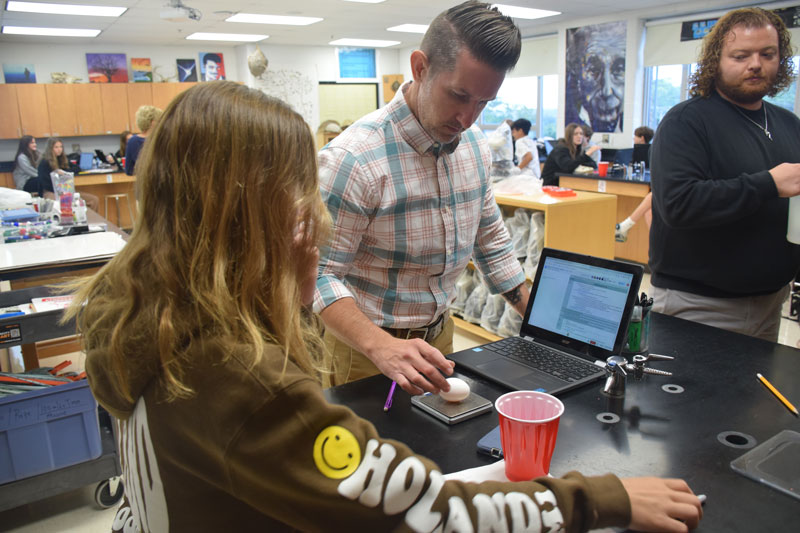
The flight from Quito to the Galápagos took 90 minutes, and, when they walked directly onto the tarmac from the plane, “I wasn’t sure how I was going to react,” Scott said, “but I got emotional. I’ve wanted to go to the Galápagos Islands since I was six or seven.”
“I am not a crier,” Kosha insisted. “I don’t even cry at Pixar movies. But I could feel my eyes start to well up a little” when she first set foot on the island. “Forty-one years of friendship and we were on the island where Darwin did his thinking, in the seat of evolutionary theory. We just clung to each other for a half minute and [Scott] said, ‘We are here, Kosh.’ And then, not even 15 steps onto the walkway, we spotted a huge iguana.”
Scott was especially excited for a student of his, Drew Hennebrey, who wants to become a herpetologist (a scientist who studies reptiles) and served as the wildlife photographer for the trip. “He reminds me of myself as a kid,” said Scott, who grew up with pet turtles and originally wanted to be a herpetologist himself.
For their service project, Scott’s class helped the Galápagos’ conservationists remove invasive plant species that threaten the islands’ delicate biodiversity — particularly an invasive willow species.
But the creatures of the Galápagos would hardly know it for their guileless comfort with humans. “They haven’t learned to fear us,” Scott explained. Even while the islands’ resident scientists were chainsawing willow trees, a group of giant tortoises calmly observed from a short distance with mild interest.
Aside from small residential buildings, labs and museums, the islands are untouched by human development, allowing Scott and his class to experience them similarly to how Darwin did in 1835.
“There were several places where a guide would stop us to say ‘Darwin stood right where you’re standing and saw what you’re seeing,’” whether it was a flock of flamingos or blue-footed boobies. “We got to see how he made the most important discovery in biology.”
“By the end of the trip, the students were able to tell the difference between a brown finch and a cactus finch based on the shape of their beak,” Scott said proudly.
One of the most impactful experiences of the trip happened while the class was scuba diving just off the coast of a black sand beach where a herd of sea lions sunbathed. Apparently driven by their own curiosity, the sea lions jumped into the water to examine the visiting humans for themselves, video of which can be found on YouTube.
“They played with us for 45 minutes. I could almost see that their eyes were dilated trying to take everything in. That meant a lot to the students,” Scott said.
According to Scott, Hennebrey said afterward, “Wouldn’t it be cool if people approached their lives as curious and wide-eyed as those sea lions did?”
“It is so clear we are part of the same system,” Kosha reflected. “You cannot help feeling connected — and responsible.”
For his next trip, Scott plans to take his class to the Sea of Cortés in summer 2024. “They call it ‘the world’s aquarium,’ on account of it having the most biodiversity of any body of water on the planet” Scott said.
He is always eager to include those who want to join, and any interested IWU alumni with children who are currently enrolled in high school or will be during the fall of 2024 can contact Scott at sgcollins80@gmail.com.
